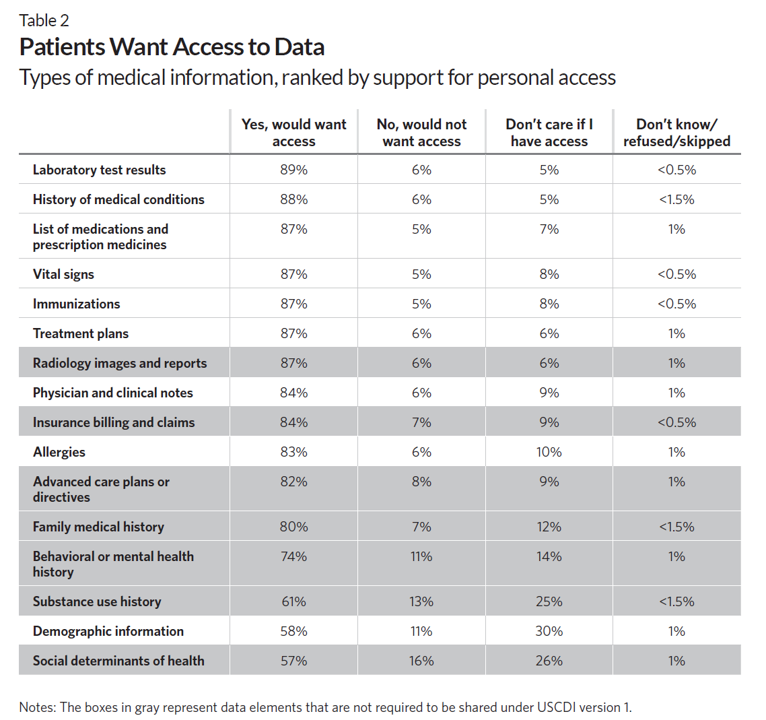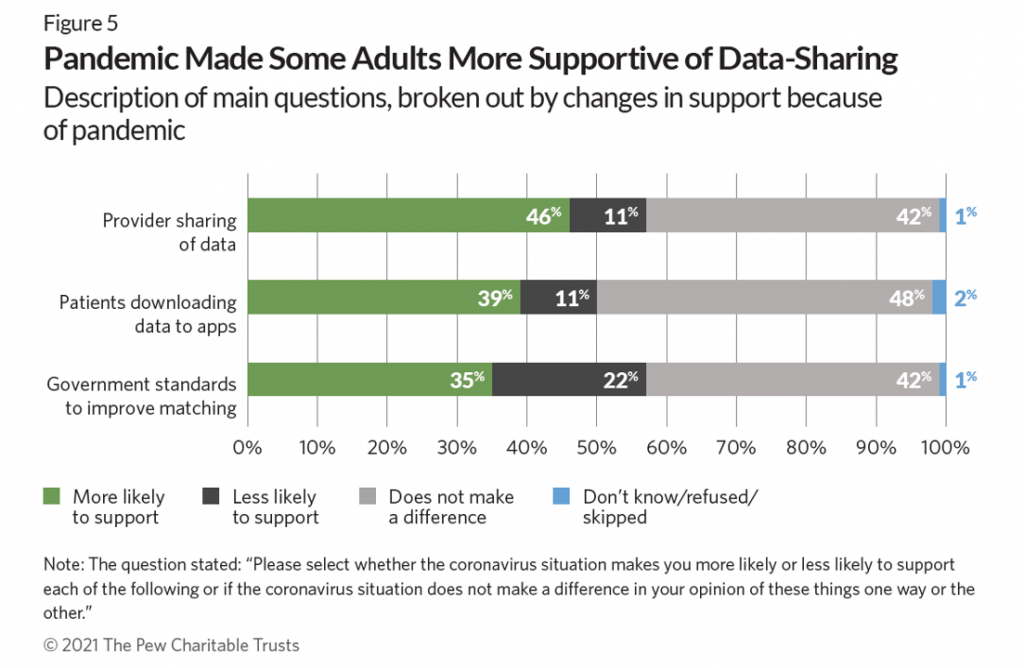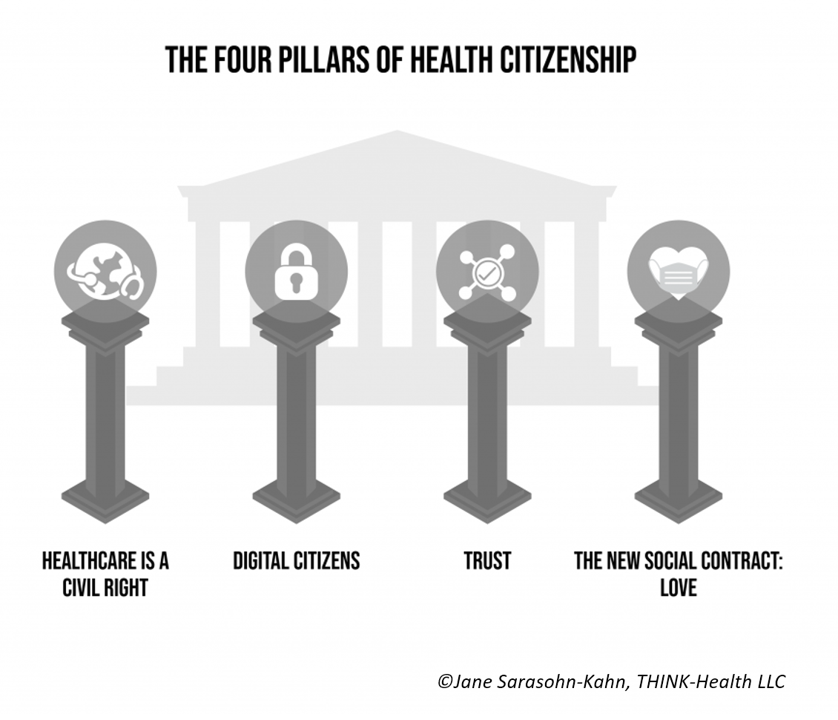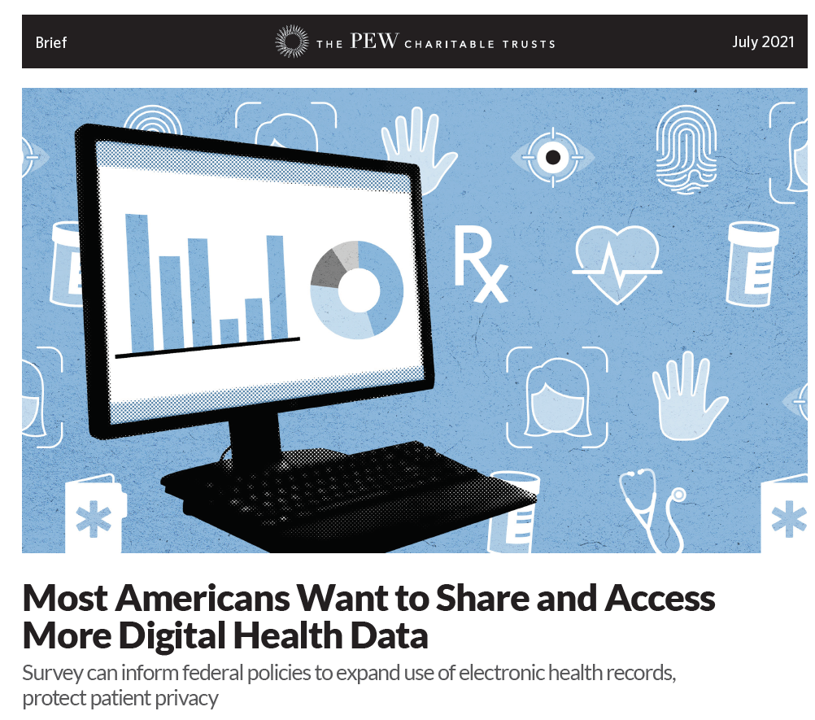“Most Americans clearly recognize the potential benefits that improved health IT can offer, and they want this transformation of the health care system to continue,” the Pew Charitable Trusts research concludes in Most Americans Want to Share and Access More Digital Health Data.
 The Pew team surveyed 1,213 adults ages 18 and over in June and July 2020, interviewing in English and Spanish.
The Pew team surveyed 1,213 adults ages 18 and over in June and July 2020, interviewing in English and Spanish.
As digital health industry stakeholders will be convening at the 2021 annual HIMSS conference in Las Vegas and digitally, this report is well-timed to give us a level-set on just “where” U.S. health citizens are with respect to their medical information.
The first chart tells us that most patients want access to various cuts of their medical information: 9 in 10 people seek lab test results, their medical history, a list of prescription drugs and medicines, vital signs, immunization history, treatment plans, and radiology images and reports.
Eight in ten health consumers would access their physician and clinical notes (an area addressed in the past several years by the ground-breaking OpenNotes project), insurance billing and claims, allergies, advance directives, and family medical history.
And most patients would also want access to information on their mental, behavioral, and substance use history.
A newer category of personal health information, social determinants of health, garners well over one-half of Americans’ interest in access that data.
 The second chart suggests that living through the COVID-19 pandemic, more Americans grew to appreciate the value of personal health information — not just for immunization data which has been a direct and present data point, but also for other aspects of health histories and social determinants that bolster or diminish peoples’ ability to deal with the virus, chronic conditions, and mental health issues.
The second chart suggests that living through the COVID-19 pandemic, more Americans grew to appreciate the value of personal health information — not just for immunization data which has been a direct and present data point, but also for other aspects of health histories and social determinants that bolster or diminish peoples’ ability to deal with the virus, chronic conditions, and mental health issues.
Nearly one-half of consumers said the pandemic compelled them to support provider sharing of data, 4 in 10 people embraced downloading data to apps, and one-third supported government standards to improve patient matching.
Across these three issues, four in 10 patients said the pandemic did not make a difference in their support for provider data sharing, downloading data to apps, and standards for patient matching.
While more Americans appear to support data sharing between their physicians, and greater access to data for their own use, it’s concerning that only 36% of patients told the Pew that their providers’ EHRs let them access their own records electronically through an app or online patient portal. As with other aspects of U.S. health care, there are health disparities when it comes to patients’ ability to access digital health data: 64% of White consumers said they had access to at least some of their EHR data, compared with 58% of African-Americans and 47% of Hispanic people. Income, too, made a difference in patients’ ability to access EHRs: folks with income below $40,000, as well as people with a high school education or less, were less likely able to access their personal health data electronically.
 Health Populi’s Hot Points: This report gives us the current snapshot of U.S. health citizens’ view on their personal health information, which I will keep in mind as I participate (virtually/digitally/telephonically) in next week’s #HIMSS21 annual conference. While I will miss meeting with technology developers and colleagues in person, I have meetings set-up via phone, Zoom, and Teams to brainstorm updates and trends with my key trusted touchpoints in health IT. I will be sharing my trend-weaves and learnings with you throughout the week, and will be baking those insights into my client work and ongoing writing and talks.
Health Populi’s Hot Points: This report gives us the current snapshot of U.S. health citizens’ view on their personal health information, which I will keep in mind as I participate (virtually/digitally/telephonically) in next week’s #HIMSS21 annual conference. While I will miss meeting with technology developers and colleagues in person, I have meetings set-up via phone, Zoom, and Teams to brainstorm updates and trends with my key trusted touchpoints in health IT. I will be sharing my trend-weaves and learnings with you throughout the week, and will be baking those insights into my client work and ongoing writing and talks.
The third chart bolsters a fact we know-we-know about patients’ faith in health care providers as trusted data stewards: that is that apps recommended by doctors and hospitals more likely make patients feel more comfortable about using them than digital tools not vetted by a trusted source.
One pillar of that trust is privacy. When survey respondents were explained that federal privacy laws (namely, HIPAA) do not cover much of the data that flows into apps (such as that from wearable tech like smartwatches, connected fitness equipment, or nutrition tracking sites), two-thirds of Americans were concerned about their potential health privacy “leakages.”
 The Pew asserts that this survey, “can inform federal policies to expand use of electronic health records, protect patient privacy.”
The Pew asserts that this survey, “can inform federal policies to expand use of electronic health records, protect patient privacy.”
This study can (should) also inform tech developers’ and health care providers’ approaches to collaborating with patients and caregivers with respect to their personal health information and the digital tools the industry stakeholders want to put into health consumers’ hands.
Patients in the U.S. have transformed into health consumers since the advent of high-deductible health insurance embedded in so-called “consumer-directed plans.” Growing out-of-pocket payments for copays and coinsurance for services and prescription drugs have also reshaped patients into consumers, increasingly facing a retail health environment that inspires many people to shop around for care and products when they are shoppable.
The pandemic has further evolved health consumers toward health citizenship — learning that without health care access, mitigated risks of social determinants of health, and trust in institutions, Life in the Coronavirus Era was very difficult. The last graphic comes out of my book, Health Citizenship: How a Virus Opened Hearts and Minds, calling out the four pillars of health citizenship: healthcare as a civil right, digital citizenship, trust, and a new social contract of love and respect for one another.
To build healthcare back better in the U.S., let’s ensure health data access and equity by design as we collaborate to emerge stronger, healthier, and a more loving community in the wake of the public health crisis.





 I am so grateful to Tom Lawry for asking me to pen the foreword for his book, Health Care Nation,
I am so grateful to Tom Lawry for asking me to pen the foreword for his book, Health Care Nation,  I love sharing perspectives on what's shaping the future of health care, and appreciate the opportunity to be collaborating once again with Duke Corporate Education and a global client on 6th May. We'll be addressing some key pillars to consider in scenario planning such as growing consumerism in health care, technology (from AI to telehealth), climate change, and trust -- the key enabler for health engagement or dis-engagement and mis-information. I'm grateful to be affiliated with the corporate education provider
I love sharing perspectives on what's shaping the future of health care, and appreciate the opportunity to be collaborating once again with Duke Corporate Education and a global client on 6th May. We'll be addressing some key pillars to consider in scenario planning such as growing consumerism in health care, technology (from AI to telehealth), climate change, and trust -- the key enabler for health engagement or dis-engagement and mis-information. I'm grateful to be affiliated with the corporate education provider  Thank you FeedSpot for
Thank you FeedSpot for